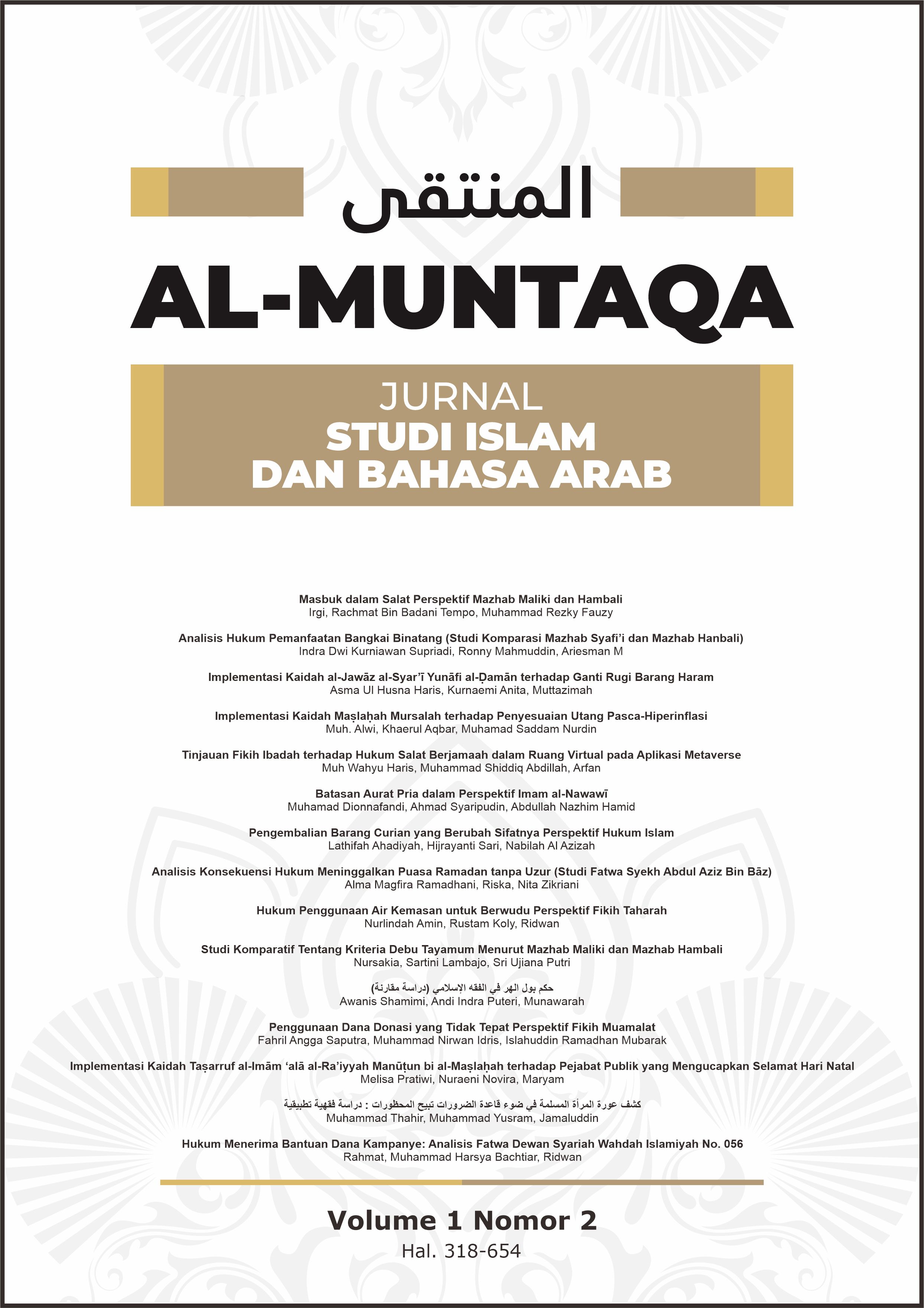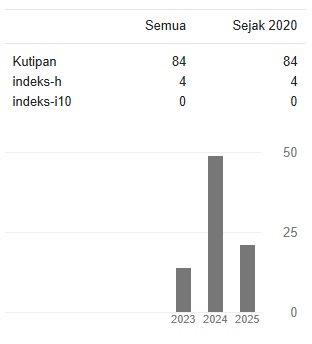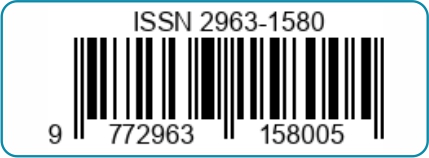Implementasi Kaidah Maṣlaḥah Mursalah terhadap Penyesuaian Utang Pasca-Hiperinflasi
Implementation of the Maṣlaḥah Mursalah Principle in Adjusting Debt after Hyperinflation
DOI:
https://doi.org/10.36701/muntaqa.v1i2.2516Keywords:
Hyperinflation, maṣlaḥah mursalah, debt adjustment, fiqh muʿāmalahAbstract
The hyperinflation crisis caused an imbalance between the real and nominal values of debt, which raised issues of fairness in Islamic financial transactions. This study aims to examine the validity of maṣlaḥah mursalah as the basis for establishing contemporary Islamic law, as well as how the validity of implementing the maṣlaḥah mursalah principle affects post-hyperinflation debt adjustments. The method used is a normative approach through literature review and empirical observation, with descriptive-qualitative analysis. The results of the study indicate that maṣlaḥah mursalah can be used as evidence in determining contemporary Islamic law. However, it cannot be justified for post-hyperinflation debt adjustments, as it has the potential to violate the basic principles of debt contracts, which are tabarru’, and is contrary to the nas. In practice, it is only justified by establishing a reference value clause from the outset, meaning that if gold is given at the time of borrowing, then gold must also be used at the time of repayment, even if the price at the time of repayment differs from that at the time of borrowing. This research finding reinforces Allah's words in the Qur'an and Hadith regarding the prohibition of usury practices that involve clear injustice and destruction to the economy of the ummah.
Downloads
References
Al-Qur’an al-Karīm
Buku
Bank Indonesia, Kajian Ekonomi dan Keuangan Syariah. Jakarta: Departemen Ekonomi dan Keuangan Syariah. 2022.
Departemen Agama Republik Indonesia, Al-Qur’an dan Terjemahnya Jakarta: Departemen Agama RI, 2002.
Gadamer, H.-G. Truth and method. Terj. J. Weinsheimer & D. G. Marshall, Trans. New York, NY: Continuum. 2014.
Al-Gazālī, Abū Ḥāmid. Ed. Muḥammad ʿAbd al-Salām ʿAbd al-Syāfī. Al-Mustaṣfā fī ʿIlm al-Uṣūl. Beirut: Dār al-Kutub al-ʿIlmiyyah, 1993.
Ibn ʿĀbidīn. Radd al-Muḥtār ʿalā al-Durr al-Mukhtār. Beirut: Dār al-Fikr, 2000.
Ibn Taimiyyah, Taqī al-Dīn. Majmūʿ al-Fatāwā, Jil. 29. Madinah: Mujammaʿ al-Malik Fahd, 2004/1425 H.
Al-Jauziyyah, ibn Qayyim. Iʿlām al-Muwaqqiʿīn ʿan Rabb al-ʿĀlamīn. Beirut: Dār ibn al-Jauzī, 1996.
Krippendorff, Klaus. Content Analysis: An Introduction to Its Methodology. Cet. IV Thousand Oaks, CA: Sage Publications, 2013.
Kammer, A., et al., The Collapse of Venezuela’s. United States: Dame Press, 2025.
Al-Kāsānī, ʿAlāʾ al-Dīn. Badāʾiʿ al-Ṣanāʾiʿ fī Tartīb al-Syarāʾiʿ, Jil. 6. Beirut: Dār al-Kutub al-ʿIlmiyyah, 1986.
Majmaʿ al-Fiqh al-Islāmī al-Duwalī. Qarārāt wa Tauṣiyyāt Majmaʿ al-Fiqh al-Islāmī al-Duwalī. Jeddah: Rabitah al-ʿĀlam al-Islāmī, 2000.
Majma‘ al-Fiqh al-Islāmī, Fatāwā al-Majma‘ fī Azmat al-Madīniyyah bi Lubnān. Jeddah: Majma‘ al-Fiqh al-Islāmī, 2020.
Al-Nawawī, Al-Majmūʿ Syarḥ al-Muhadzdzab, Juz 1 Beirut: Dār al-Fikr, 1995.
Al-Qarḍāwī, Yūsuf. Dirāsah fī Fiqh al-Maqāṣid: bana al-Maqāṣid al-Kulliyyah wa al-Naṣūṣ al-Juzʾiyyah. Beirut: Muʾassasat al-Risālah, 1998.
Al-Qarāfī, Aḥmad ibn Idrīs. Al-Furūq. Beirut: ʿĀlam al-Kutub, 1998.
Al-Qarḍāwī, Yūsuf. Fiqh al-Zakāh, Cet. II. Beirut: Muʾassasah al-Risālah, 1998.
Al-Qurṭubī, Muḥammad ibn Aḥmad. al-Jāmiʿ li-Aḥkām al-Qurʾān, Juz. 3. Beirut: Dār al-Kutub al-ʿIlmiyyah, 2006.
Sukirno, Sadono, Makroekonomi: Teori Pengantar, Jakarta: RajaGrafindo Persada, 1995.
Al-Syāṭibī, Ibrāhīm ibn Mūsā. Al-Muwāfaqāt fī Uṣūl al-Syarīʿah. Juz 2. Cet I. Beirut: Dār al-Maʿrifah, 1997.
Al-Syāfiʿī, Muḥammad ibn Idrīs. al-Risālah. Ed. Aḥmad Muḥammad Syākir. Beirut: Dār al-Maʿārif, 1979.
Al-Saraksyī, Muḥammad ibn Aḥmad. al-Mabsūṭ, Juz. 21. Beirut: Dār al-Maʿrifah, 1994/1414 H.
Al-Suyūṭī, Jalāl al-Dīn. Al-Asybāh wa al-Naẓāʾir. Beirut: Dār al-Kutub al-ʿIlmiyyah, 1990.
Al-‘Uṡaimīn, Muḥammad bin Ṣāliḥ. Majmūʿ Fatāwā wa Rasāʾil ibn ‘Uṡaimīn, Juz. 18. Riyadh: Dār al-Thurayyā, 2005.
Al-‘Uṡaimīn, Muḥammad bin Ṣāliḥ. Fatāwā Nūr ‘alā al-Darb, Juz 12 Riyāḍ: Dār al-Thurayyā, 2002, h. 313.
Warjiyo, Perry, Kebijakan Moneter di Indonesia, Jakarta: Rajawali Pers, 2016,
Al- Zuḥailī, Wahbah. al-Fiqh al-Islāmī wa Adillatuh, Juz. 4.Cet. VIII Dimashq: Dār al-Fikr, 2006.
Jurnal
Ajuna, Luqmanul Hakiem. Maslahah Mursalah: Implementasinya pada Transaksi Ekonomi. Asy Syar’iyyah: Jurnal Ilmu Syari’ah dan Perbankan Islam 4, no. 2 (Desember 2019): h. 170–192.
Aprillianto, B., & Wardhaningrum, O. A. (2021). Pandemi Covid-19: Lebih baik menambah utang atau ekuitas? Jurnal Akuntansi Universitas Jember, 19(1), h. 23–34.
Anto, H., Fakhrunnas, F., & Tumewang, Y. K. (2022). Islamic banks credit risk performance for home financing before and during COVID-19 pandemic. Jurnal Ekonomi dan Bisnis, 14(1), h. 205–224.
Benuf, K., dan M. Azhar. "Metodologi Penelitian Hukum sebagai Instrumen Mengurai Permasalahan Hukum Kontemporer." Gema Keadilan 7, no. 1 (April 2020): h. 20–33.
Fakultas Ekonomi dan Bisnis Universitas Brawijaya. Fenomena utang dalam pandemi. Jurnal FEB UB. 2021
Hamdan, S. (2020). The necessity of late payment fees in Islamic home financing: A Maṣlaḥah Mursalah perspective. International Journal of Islamic Finance, 12(2), h. 130–143.
Hänsel, M. Idiosyncratic risk, government debt and inflation. arXiv. 2024.
Iskandar, Azwar, Bayu Taufiq Possumah, and Khaerul Aqbar. "The Inflation And Poverty In Indonesia: Consequence Of Usury?." Jurnal Ilmiah Al-Syir'ah 17, no. 2 (2019): 91-105.
Khoir, S., & Sulaiman, A. Maṣlaḥah Mursalah: Theoretical foundation for income and wealth policy in Indonesia. Shirkah: Journal of Economics and Business, 9(3), 360–377. https://shirkah.or.id/new-ojs/index.php/home/article/view/716.
Muhdlor, Ahmad Zuhdi. "Perkembangan Metodologi Penelitian Hukum." Jurnal Hukum dan Peradilan 1, no. 2 (2012).
Mergaliyev, A., Asutay, M., & Avdukic, A. (2019). Higher ethical objective (Maqāṣid al-Sharīʿah) augmented framework for Islamic banks: Assessing ethical performance. Journal of Business Ethics. https://doi.org/10.1007/s10551-019-04152-8.
Novanto, E. D., & Soebagiyo, D. (2024). Pengaruh utang luar negeri, defisit anggaran dan jumlah uang beredar terhadap inflasi di Indonesia tahun 1998–2023. YUME: Journal of Management, 7(3), 119–126.
Qorib, A., & Harahap, I. (2016). Penerapan maslahah mursalah dalam ekonomi Islam. Analytica Islamica: Jurnal Ilmu Syariah dan Hukum, 5(1), h. 55–80.
Shofiyah, Z., & Ghozali, M. L. (2021). Implementasi konsep maslahah mursalah dalam mekanisme pasar. Al-Mustashfa: Jurnal Penelitian Hukum Ekonomi Islam, 6(2), h. 135–145.
Usman, M. (2020). Maslahah mursalah sebagai metode istinbath hukum perspektif Al-Thufi dan Al-Qaradhawi. Al-Mashlahah: Jurnal Hukum Islam dan Pranata Sosial Islam, 8(1), 82–98. https://doi.org/10.30868/am.v8i1.708.
Yani, Muhammad Turhan, Nurhasan Nurhasan, Totok Suyanto, Abdul Hafidz, and Moh Mudzakkir. “Ẓāhirat al-Taṭarruf al-Dīnīy fī ‘Ālam al-Shabāb wa al-Ta‘Alīm: Dirāsah ‘an Ṣ‘ūd al-Ḥarakah al-Islāmīyah al-Rādīkālīyah fī al-Madāris al-Thānawīyah fī Indūnīsiyā.” Journal of Indonesian Islam 14, no. 1 (June 3, 2020): h. 260. doi:10.15642/JIIS.2020.14.1.260-286.
Situs, dan Sumber Online:
“Fatwa No. 48/DSN-MUI/II/2005, tentang Penjadwalan Kembali Tagihan Murabahah”. Situs Resmi DSN-MUI. https://dsnmui.or.id/kategori/fatwa/page/12/ (17 Februari 2005).
International Monetary Fund (IMF), “Zimbabwe: 2009 Article IV Consultation—Staff Report; Public Information Notice on the Executive Board Discussion; and Statement by the Executive Director for Zimbabwe”, Situs Resmi Imf. 31 Desmber 2016 https://www.imf.org/external/pubs/ft/scr/2009/cr09139.pdf. (11 Juni 2025).
Kementerian Keuangan Republik Indonesia. “Statistik utang pemerintah Indonesia”, Official Website Kementerian Keuangan Republik Indonesia. 27 April 2025 https://www.djppr.kemenkeu.go.id/sulni. (10 Juni 2025).
Al-Mubarak, T., & Osmani, N. M. Applications of Maqāṣid al-Sharīʿah and Maṣlaḥah in Islamic banking practices: An analysis. International Islamic University Malaysia. https://www.iium.edu.my. (19 Juni 2025)
Otoritas Jasa Keuangan (OJK), “Penerapan Prinsip Kehati-hatian dalam Produk Pembiayaan Syariah”, Situs Resmi Ojk. 20 Januari 2016 https://ojk.go.id/id/regulasi/Documents/Pages/Penyelenggaraan-Teknologi-Informasi-Oleh-Bank-Umum/POJK%2011%20-%2003%20-%202022.pdf. (11 Juni 2025)
Downloads
Published
Issue
Section
License
Copyright (c) 2025 Muh.Alwi, Khaerul Aqbar, Muhamad Saddam Nurdin

This work is licensed under a Creative Commons Attribution-NonCommercial-ShareAlike 4.0 International License.










